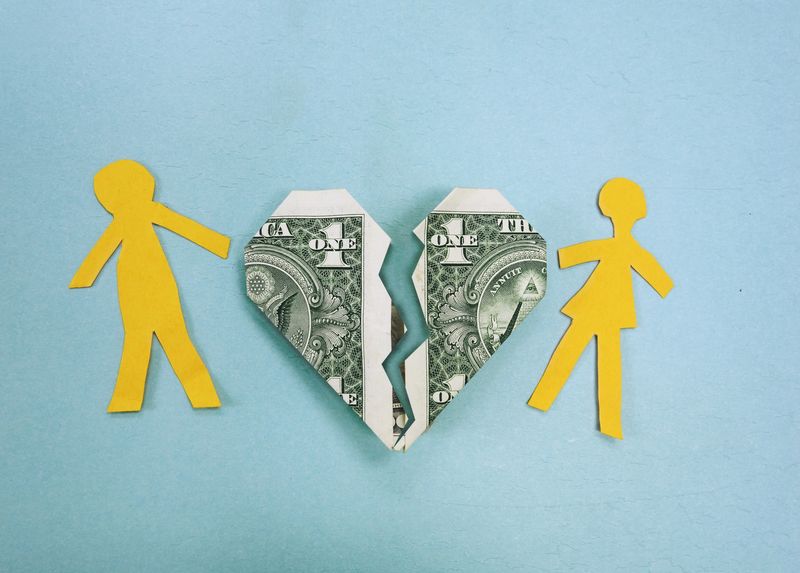Navigating the dating scene after a divorce can be both exciting and daunting. With newfound freedom often comes vulnerability, making it crucial to recognize potential pitfalls. While love might be in the air, not all relationships start on the right foot. Especially for those fresh out of long-term commitments, recognizing early warning signs can save emotional energy and heartache down the line. This guide explores twenty key red flags that every new divorcee should keep an eye out for. From inconsistent behavior to excessive secrecy, these indicators can help you make informed decisions about your romantic future.
1. Inconsistent Communication

Frequent delays in responses may hint at deeper issues. Rapid shifts from constant messaging to total silence can reflect a lack of genuine interest or emotional unavailability.
This pattern often leaves one feeling uncertain and undervalued. Transparent and consistent communication is foundational in any relationship.
If your partner struggles to maintain this basic tenet, it might be time to reassess their priorities and intentions. Prioritize partners who are eager to engage.
This helps ensure trust and emotional security in the relationship’s early stages.
2. Excessive Secrecy

If they seem overly protective of their personal space, it might not be just about privacy. Guarded phone behavior or evasive answers to simple questions can signal hidden aspects of their life.
A lack of openness can create barriers to forming genuine connections. Transparency is key for trust.
While everyone deserves privacy, excessive secrecy often indicates deeper issues. Consider if this behavior aligns with your values and comfort levels.
Healthy boundaries are one thing, but secretiveness can be a red flag worth addressing.
3. Unavailable for Important Events

Missing significant moments in your life can highlight a lack of commitment. From skipping your birthday to being absent during major milestones, this can suggest they’re not fully invested.
Shared experiences are crucial in cementing bonds. Their absence might make you feel secondary.
Evaluate whether their inconsistency is due to unavoidable reasons or a pattern of neglect. Genuine partners make time for what matters.
If this is a recurring issue, it may be time to evaluate the relationship’s potential long-term viability.
4. Emotional Unavailability

Struggling to open up emotionally can hinder relationship growth. If they shy away from discussing feelings, it might indicate they’re not ready for a deep connection.
An emotionally absent partner can make you feel isolated and unsupported.
Emotional availability is vital for a fulfilling partnership. Consider if this aligns with your needs.
If they consistently resist sharing their inner world, it’s worth questioning their readiness for commitment. Seek partners who are willing to engage emotionally.
5. Frequent Comparisons to Ex

Constantly mentioning past relationships can stifle new connections. If they frequently compare you to their ex, it might mean they’re not fully over their previous partner.
This can create unnecessary pressure and insecurities. A relationship should focus on the present, not the past.
Address this behavior if it arises and express your feelings. A partner still entangled in past emotions may not be ready to move forward.
Open communication about this can help; however, unresolved issues are a significant red flag.
6. Dismissive of Your Needs

Ignoring or belittling your needs can signify a lack of respect. A partner who is indifferent towards your desires or concerns may not prioritize the relationship.
Feeling heard and valued is crucial for healthy dynamics. Consider if staying in this relationship aligns with your self-worth.
A dismissive attitude can erode trust and satisfaction over time. Seek partners who listen actively and engage constructively.
Open, reciprocal communication supports fulfilling interactions and personal growth.
7. Jealousy and Possessiveness

Excessive jealousy can suffocate personal freedom. If they constantly question your interactions or need reassurance, it might stem from insecurity.
Though some jealousy is natural, possessiveness should be a concern. Such behavior can lead to controlling dynamics.
Evaluate whether this aligns with a healthy relationship vision. Trust is essential for enduring bonds.
If jealousy overshadows joyful moments, it’s worth addressing through honest dialogue or reconsidering the relationship.
8. Lack of Personal Goals

Ambition drives personal and shared growth. If your partner lacks personal goals, it might reflect stagnation or dependency.
Understanding each other’s aspirations fosters mutual support and encouragement.
Discussing future goals helps align visions and builds a shared path. A lack of direction might indicate a potential mismatch in life priorities.
Ensure that your partner’s outlook complements your own aspirations and forward journey.
9. Too Much Too Soon

Rushing into intense commitments can be overwhelming. Lavish gestures or immediate declarations of love might feel insincere.
This pace often masks deeper issues or unmet needs. Healthy relationships develop organically over time.
Consider if this speed feels comfortable or forced. A balanced progression allows genuine bonds to form.
If things move too fast, discuss your comfort level and expectations to ensure mutual understanding.
10. Flakiness and Unreliability

Often canceling plans or showing up late can suggest a lack of seriousness. This behavior may signify they’re not valuing your time or the relationship.
Dependability is key to building trust and ensuring mutual respect.
Evaluate whether these actions are patterns or occasional slip-ups. A consistent lack of reliability is a notable red flag.
Partners should strive to keep commitments, demonstrating respect for each other’s time and efforts.
11. Disrespectful Behavior

Mocking or belittling remarks can signify underlying issues. Disrespect in any form is harmful and erodes self-esteem.
A respectful partner values your opinions and emotions, fostering a safe environment.
Address any disrespectful behavior immediately to set boundaries. Mutual respect is essential for a thriving relationship.
Continued disrespect might indicate incompatibility or deeper relational problems.
12. Overly Critical

Persistent criticism can undermine confidence. If they constantly point out faults or shortcomings, it might indicate deeper insecurities.
Constructive feedback builds, while excessive critique damages.
Consider if their comments contribute positively to your growth or simply harm your self-worth. A balanced perspective is key.
Discuss your feelings about this behavior to ensure understanding and mutual respect.
13. Financial Irresponsibility

Poor financial habits can strain relationships. If they consistently mismanage money or avoid financial discussions, it might impact the future.
Understanding financial priorities is crucial for long-term stability.
Evaluate if their financial behavior aligns with your values and goals. Financial harmony fosters trust and confidence.
Open discussions about finances ensure transparency and shared responsibility.
14. Avoids Defining the Relationship

Hesitancy to label the relationship can suggest commitment issues. If they’re unwilling to discuss your status or future, it might indicate uncertainty.
Clarity in a relationship provides security and shared understanding.
Communicate your needs and assess if this behavior aligns with your relationship goals. A clear definition supports a shared path forward.
Ambiguity can lead to misunderstandings and strained interactions over time.
15. History of Infidelity

Past cheating can indicate a pattern. If they’re open about a history of infidelity, it might suggest unresolved commitment issues.
Consider if this aligns with your values and trust expectations.
Discussing past behaviors helps gauge their growth and intentions. Trust is foundational, and past actions can influence current dynamics.
Ensure that their past aligns with your vision for a faithful partnership.
16. Lack of Empathy

An inability to empathize can hinder emotional connections. If they dismiss your feelings or struggles, it might suggest emotional barriers.
Empathy fosters understanding and compassion in relationships.
Evaluate if their reactions align with your emotional needs. A supportive partner listens and cares genuinely.
Discuss the importance of empathy in building a strong, supportive bond.
17. Controlling Behavior

Excessive control can stifle individuality. If they dictate your actions or choices, it might reflect insecurity or power imbalances.
A healthy relationship respects autonomy and supports mutual growth.
Consider if their behavior aligns with your vision for a balanced partnership. Open dialogue can address concerns and set boundaries.
Control can lead to an unhealthy dynamic, undermining trust and personal freedom.
18. Disinterested in Family and Friends

A lack of interest in your social circle can isolate you. If they avoid or dismiss your family and friends, it might reflect disinterest in your life.
Involvement with loved ones strengthens bonds and enriches relationships.
Consider if their attitude aligns with your social values and expectations. Engaging with your circle fosters connection and mutual support.
A partner’s disinterest might suggest deeper relational issues.
19. Substance Abuse Issues

Addiction can strain relationships and create instability. If they struggle with substance abuse, it might indicate deeper personal issues needing attention.
Consider if this aligns with your vision for a stable, supportive relationship.
Discuss the impact of their behavior on the relationship and explore support options.
Addressing addiction requires understanding and compassion but also clear boundaries for a healthy partnership.

Well, hello there!
My name is Jennifer. Besides being an orthodontist, I am a mother to 3 playful boys. In this motherhood journey, I can say I will never know everything. That’s why I always strive to read a lot, and that’s why I started writing about all the smithereens I came across so that you can have everything in one place! Enjoy and stay positive; you’ve got this!

